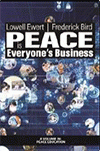
Peace is Everyone's Business
Edited by:
Lowell Ewert, University of Waterloo
Frederick Bird, University of Waterloo
A volume in the series: Peace Education. Editor(s): Laura L. Finley, Barry University.
Published 2021
The premise of this book is very simple. While acknowledging that much progress has been made since the end of World War II to improve life conditions for billions of people and reduce the likelihood of war, current global challenges threaten to undermine, undo, or even reverse much of the progress made. Growing political and social polarization, and the resultant increasing fear of each other, is on a trajectory that could cause unprecedented harm. The book illustrates how everyone can have an impact on peace and that many already do so in both constructive and negative ways, illustrated by many examples. The book offers an expansive view of peace, which includes promoting human rights, identifying and resolving situations of slow violence, working to promote fair and sustainable economic development, identifying and resolving injustices, and establishing institutions and practices for resolving conflicts by communicative means.
The book especially focuses on the role universities can and should play in promoting peace. Universities, which have played a pivotal role in creating a more humane and just world through their research, teaching and scholarship, now face the challenge of thoughtfully examining how each discipline and vocation and the university as a whole can contribute to fostering peace. In general, universities help to prepare students actively to work for peace by cultivating their capacities at reasoning and reflecting, developing their skills in communicating and research, and fostering among them an active awareness of their responsibilities as citizens of the world. While not every discipline or vocation shares the same level of responsibility to advance peace, all have the potential to do so as they intentionally and thoughtfully look for avenues to do so.
CONTENTS
Preface, Lowell Ewert and Frederick Bird. Introduction, Lowell Ewert and Frederick Bird. PART I: FRAMEWORK FOR EXPLORING PEACE. The University’s Responsibility for Peace, Frederick Bird and Lowell Ewert. What is Peace? A Global Framework, Lowell Ewert. Grounding the Global Vision: The Micro-Dynamic Web of Peace, Lowell Ewert. The Many Ways People Have Acted to Foster Peace: An Analytical Typology and a Set of Ethical Arguments, Frederick Bird. PART II: INDIGENOUS PERSPECTIVE AND WISDOM. Teaching Peace to Criminal Justice Students by using a Decolonizing Pedagogy, Niibikwe Trites, Myeengun Henry, and Judah Oudshoorn. Abolition & Decolonization as Pedagogy and Practice, Craig Fortier. PART III: DIVERSE DISCIPLINARY PERSPECTIVES FOR EXPLORING PEACE. How Math can Help to Create Peace, Judith Koeller. Biology and Peace, David Rose. The Relevance of Systems Design Engineering for Resolving Complex Conflict and Promoting Peace, Amanda Garcia and Simone Philpot. Teaching About Peace: Honoring Experience and Values, Mary Lou Klassen. Fostering Peace at the Margins: Reflections of an Anthropologist Confronting Risk Situations in Sub-Saharan Africa, Dennis Willms. Law and Peace, Lowell Ewert. Working for Peace on the Job: Reflections from a Liberal Arts Perspective, Frederick Bird. The Interdependence and Interconnection of Health and Peace, Izzeldin Abuelaish. Planning and Peace, Jennifer Ball and Kristen Regier. In the Trenches: Integrating Peace Education within Initial Teacher Preparation, Colleen Willard-Holt and Sara Rose Taylor. PART IV: CONCLUSION AND A WAY FORWARD. Conclusion, Lowell Ewert and Frederick Bird. Invitation-Challenge, Lowell Ewert and Frederick Bird. Biographies.
-
Paperback978-1-64802-596-9
Web price: $45.04 (Reg. 52.99)
-
Hardcover978-1-64802-597-6
Web price: $80.74 (Reg. 94.99)
- eBook978-1-64802-598-3

- EDU029050 - EDUCATION: TEACHING METHODS & MATERIALS: Arts & Humanities
- EDU040000 - EDUCATION: Philosophy & Social Aspects
- PSY000000 - PSYCHOLOGY: General
-
 Coronavirus and Vulnerable People
Addressing the Divide in Harm and Responses and Exploring Implications for a More Peaceful World
Coronavirus and Vulnerable People
Addressing the Divide in Harm and Responses and Exploring Implications for a More Peaceful World
-
 Difficult Discussions
Issues and Ideas for Engaging College Students in Peace and Justice Topics
Difficult Discussions
Issues and Ideas for Engaging College Students in Peace and Justice Topics
-
 Experiential Learning in Higher Education
Issues, Ideas, and Challenges for Promoting Peace and Justice
Experiential Learning in Higher Education
Issues, Ideas, and Challenges for Promoting Peace and Justice
-
 Humanities Perspectives in Peace Education
Re-Engaging the Heart of Peace Studies
Humanities Perspectives in Peace Education
Re-Engaging the Heart of Peace Studies
-
 Lessons for Creating a Culture of Character and Peace in Your Classroom
A Playbook for Teachers
Lessons for Creating a Culture of Character and Peace in Your Classroom
A Playbook for Teachers
-
 Teaching Peace Through Popular Culture
2nd Edition
Teaching Peace Through Popular Culture
2nd Edition
-
 The New Peace Linguistics and the Role of Language in Conflict
The New Peace Linguistics and the Role of Language in Conflict

